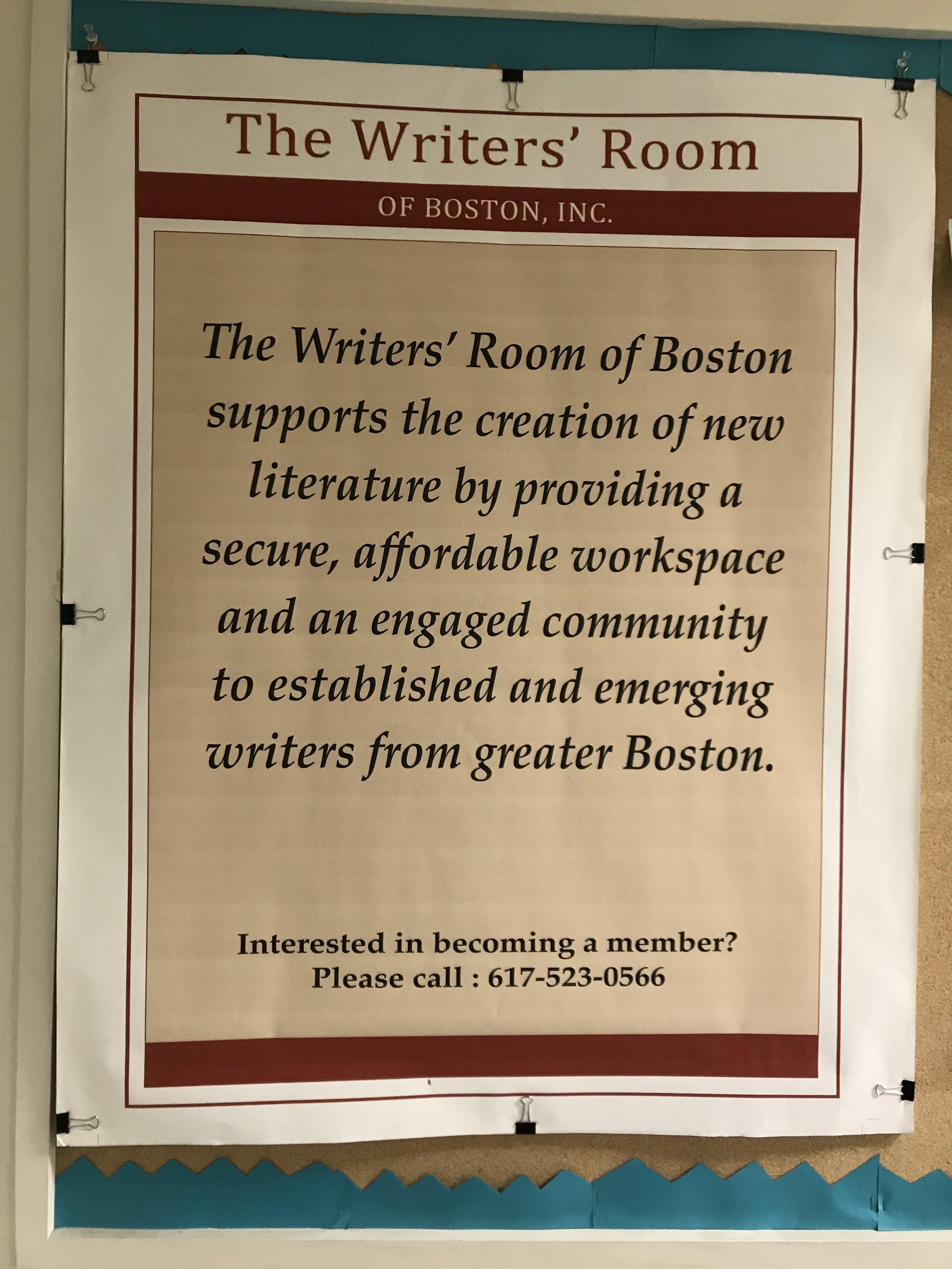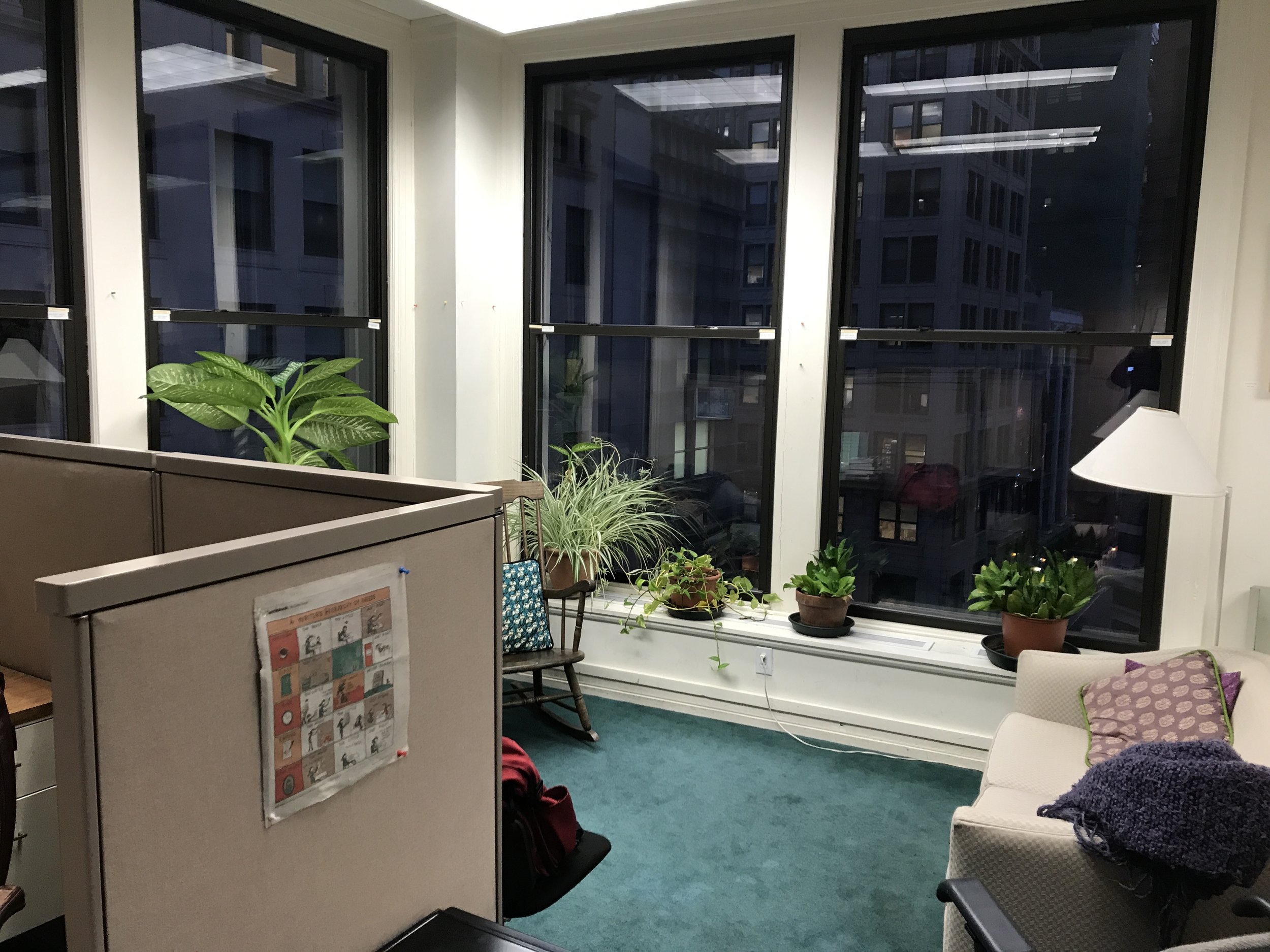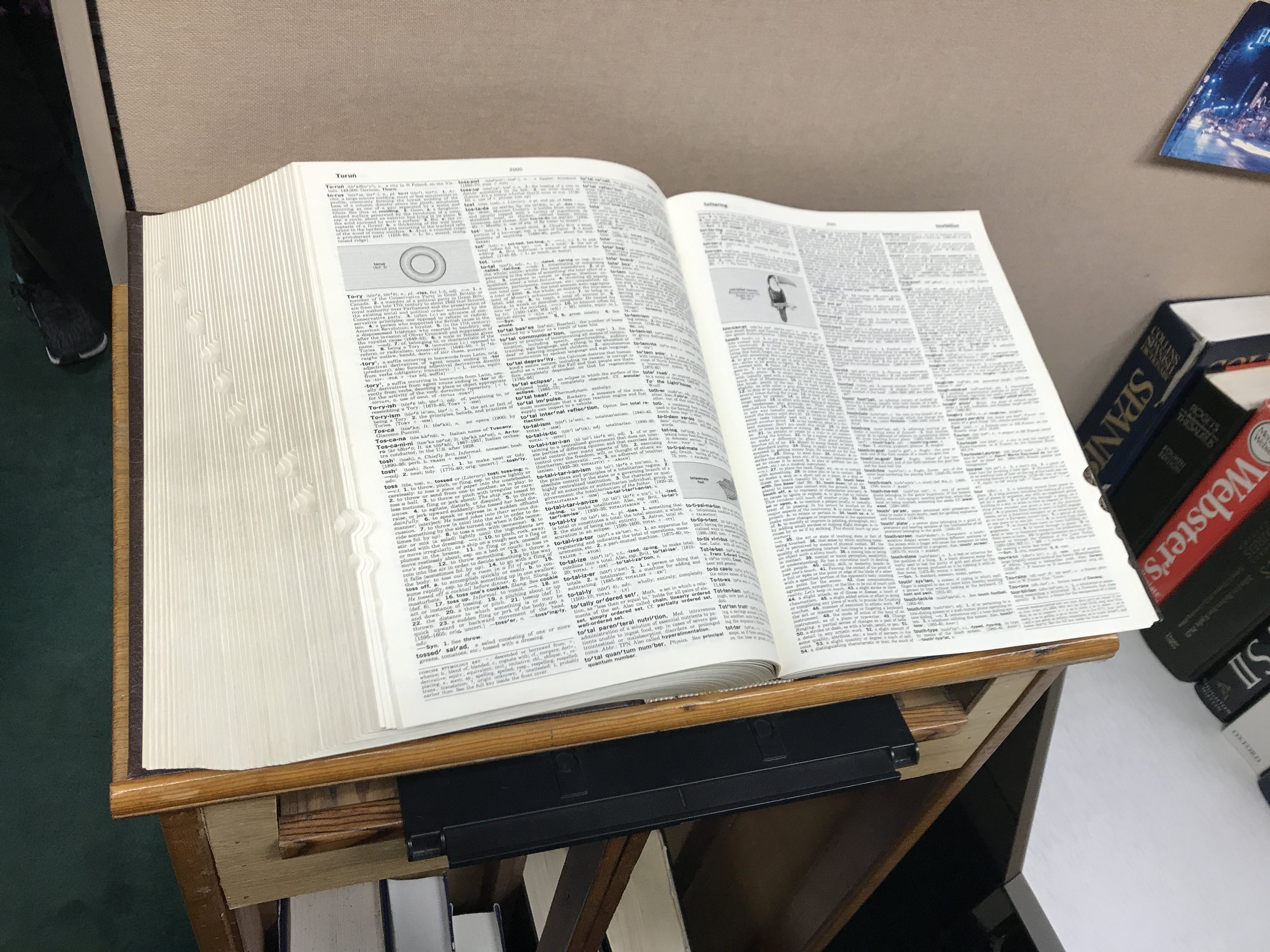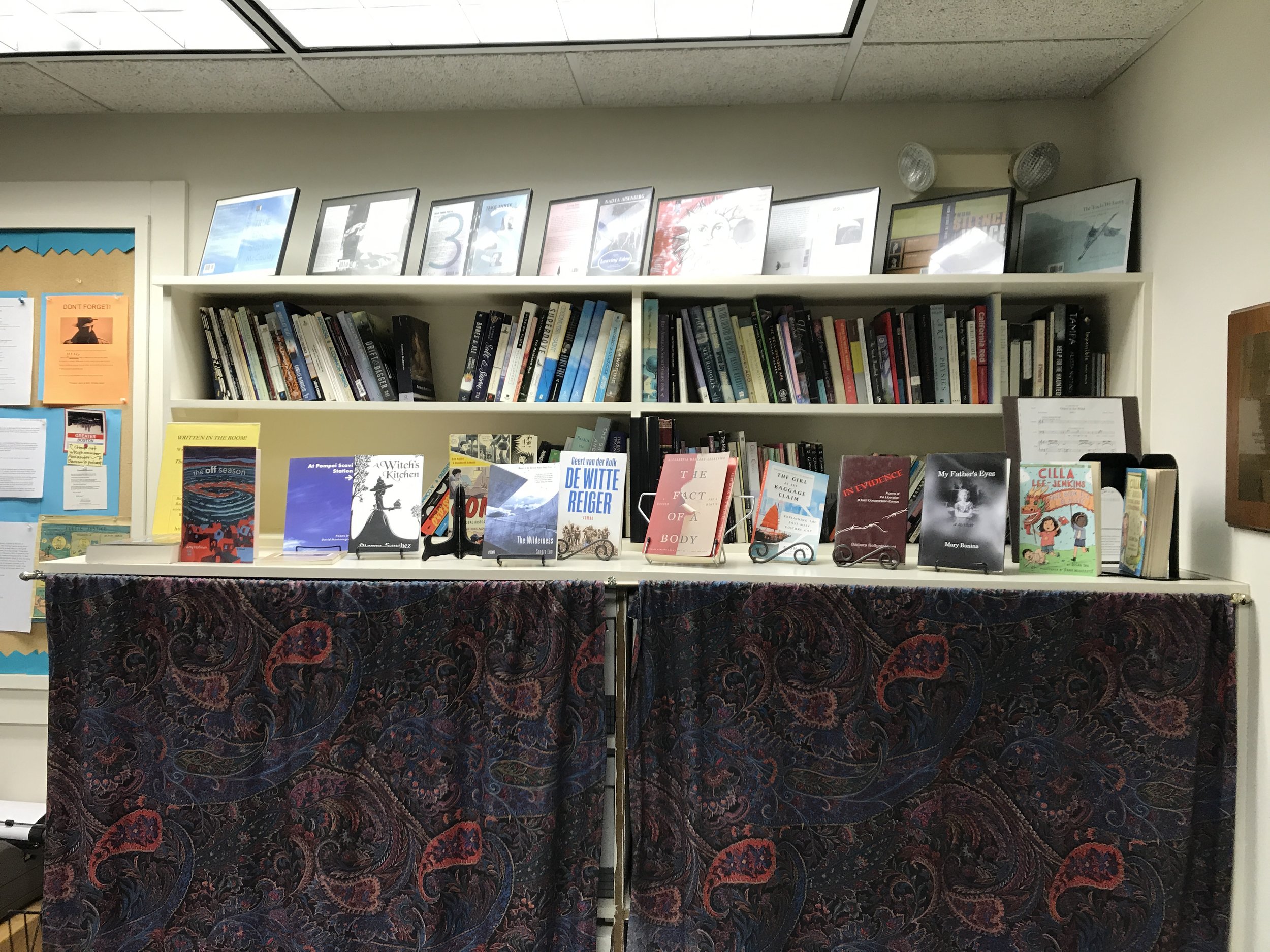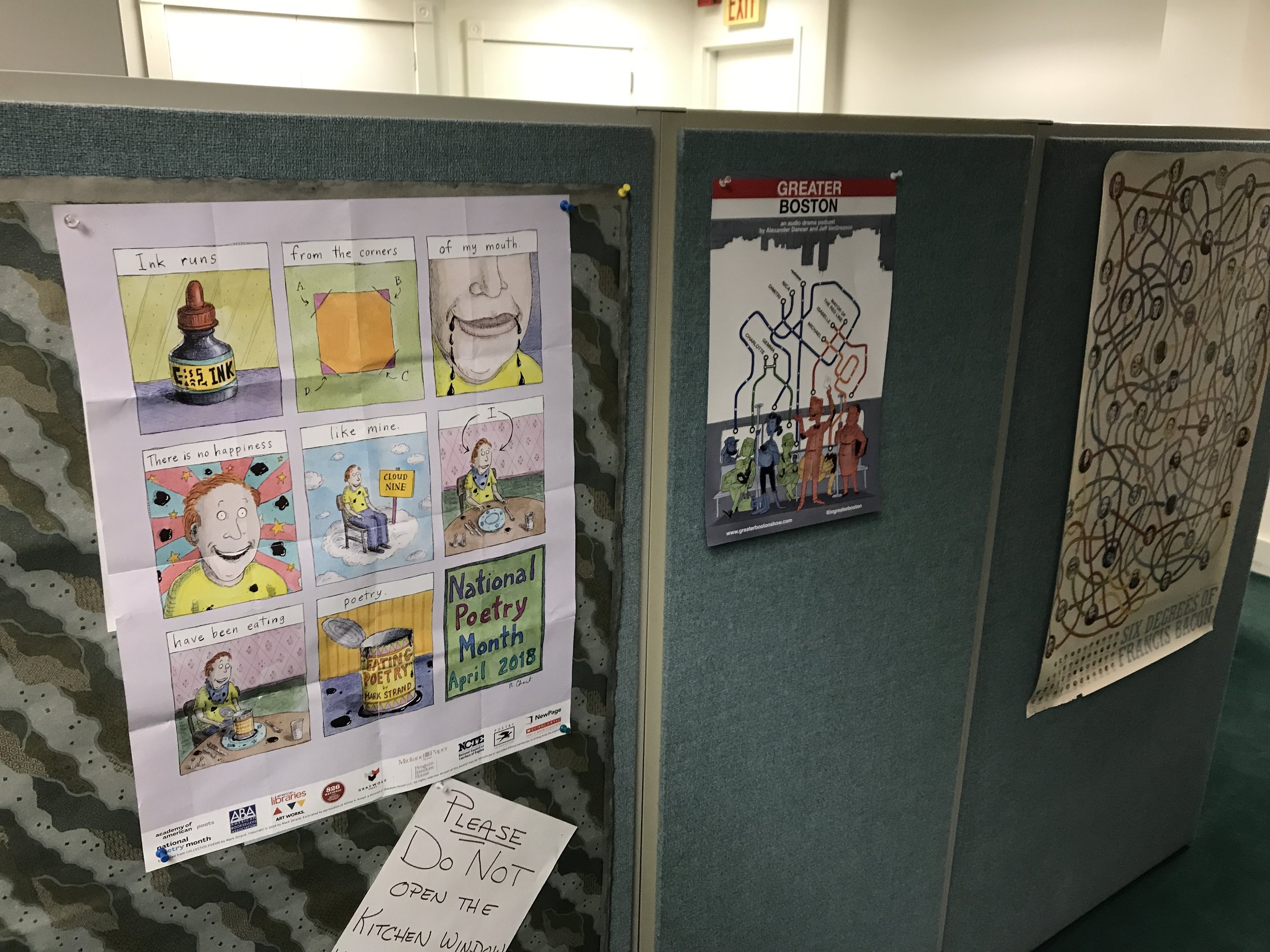Writers Finding Room: A Dedicated Space for Creativity in Downtown Boston
By Jessica A. Kent
Nov. 7, 2018
The Writers’ Room of Boston, opened in 1988, is celebrating thirty years of being an “urban writers' retreat committed to providing a quiet, affordable, and secure workspace for emerging and established writers.” Originally located in the Transportation Building on Boylston Street, it’s made its home for the last decade on State Street, on the fifth floor of a building located between the Custom House and the Old State House, just up from Long Wharf. And the Writers’ Room is evolving into a storied Boston literary institution worthy of its historic location. An article in the New York Times from 1989 on the Writers’ Room shows that although the location has changed, little else has: The Writers’ Room provides desks, chairs, sparse interiors, and opportunity to writers looking for a space, both physically and mentally, to create.
A City Sanctuary
Today, the State Street location is only accessible by key given to members of the Writers’ Room, and is available 24 hours a day. The elevator opens onto a lobby entrance area filled with books written by former and current Writers’ Room members, a large poster stating the Writers’ Room mission, and a bulletin board advertising literary events. The heart of the space is its eleven cubicles, some facing the massive windows onto State Street, some located more in the interior. Evidence of writerly inspiration is everywhere: Dictionaries open to found words, colored paper containing writing prompts strung along the side of a cubicle wall, stacks of books on many available spaces, posters with writing-related cartoons. There’s a little sitting area with chairs and a couch, as well as a small kitchen with another table at which to write. But the most distinctive feature of the room? Silence, which is understood and upheld. If there are conversations, they happen in the kitchen.
“To me, this has become my community,” said Kate Gilbert, a member of the Writers’ Room and of the Board of Directors, who kindly gave me a tour of the space. Gilbert is a middle grade author who found the Writers’ Room through a web search four years ago after moving to Boston. Since then she’s worked on two books, found an agent, and has a work out on submission. She’s been a member ever since finding the Writers’ Room, but told of individuals who have been here for much longer, even from near the beginning.
Why would someone choose to commute to this place to write? Of course, there are as many different reasons for desiring a space as there are writers in the space. For some, it’s a chance to have a writing desk where there isn’t one at home. For others, the Writers’ Room provides the structure of “going to work.” The Writers’ Room may also be a needed retreat from a busy household. Still others desire a physical space to produce a psychological shift into writing.
Writing Together
That isn’t to say that the Writers’ Room is a cloister. With its primary function giving writers a silent space to write, members can choose how much or how little they want to be involved in the community of the space. Many choose to come in, do their work, and leave; others strike up friendships or collaborations. Despite the preferred scale of involvement, the Writers’ Room does make efforts to solidify the members, including picnics, readings, newsletters, and facilitating ways to share what you’re working on. But even without the socialization, there’s something to being in the same space together. “To me, there’s a sort of aggregate atmosphere out there [in the cubicles]. If there are even just one or two other people, and you can hear them clicking away on their computer…you know they’re doing more or less the same thing that you’ve come to do,” explained Gilbert. “It’s an atmosphere of production.”
The members of the Writers’ Room will also attend each other’s book launches and readings. With 50 members, the Writers’ Room community spans ages and walks of life, and more importantly, genres. You’ll find authors working on fiction, non-fiction, and poetry, but also graphic novels, plays, journalistic pieces, memoirs, children’s and young adult literature, and more. As we walked through the space, I saw a number of books - on tables and in a library in the lobby - written by present and past members. It’s a reminder that while the Writers’ Room may not be hosting nightly events, they are incubating the writers and voices that are being featured at events around Boston.
Opportunity for Emerging Writers
In talking with Gilbert, it was clear that a priority of the Writers’ Room is to cultivate diversity among its members, and one way they are able to do so is through their four fellowships. “Since I’ve been here we’ve made a real effort to bring in people from all different groups, especially underrepresented groups, and especially with the fellowships,” said Gilbert. Offered each year, from March to February, a Writers’ Room fellowship allows a writer access to the space for free. Fellowship recipients also have the opportunity to contribute to the blog, assist with outreach, have a public reading (if they choose), and more. Previously designated by genre – “fiction fellowship,” “non-fiction fellowship,” etc. – the fellowships are no longer designated because so many applicants are working on such varied projects. The application for fellowships is open through January 15, 2019, and it has no fee.
On their 25th anniversary, the Writers’ Room named The Gish Jen Fellowship for Emerging Writers, in honor of local author Gish Jen, a long-time member of the Writers’ Room Advisory Board. Of the Writers’ Room, Jen says, “Every writer is, in the profoundest way, on his or her own, and there is little we can do to help. Inspiration comes or it doesn’t, the form comes or it doesn’t, the end comes or it doesn’t. But nothing comes without a quiet place to sit and try things, and read them over, and try them again, and that is something we can do something about.”
Beyond the fellowships, the Writers’ Room continually takes applications for membership. If approved, the monthly fee for usage of the space is $100 – not bad for downtown Boston. A 501(c)3, the Writers’ Room relies also on grants, backing from the Mass Cultural Council and Boston Cultural Council, and fundraising.
The No-Show Gala
Ever desire the chance to attend a fundraising gala without having to leave the house? One of the ways the Writers’ Room is able to offset its costs and provide fellowships is through fundraising, and last year, they came up with the idea of a “no-show gala.” Instead of an event out in the city, where one would buy a table, socialize, and listen to speakers, the Writers’ Room is providing the opportunity to experience a gala with none of the social commitment. Last year the honoree was Edgar Allan Poe, and a donation got the “attendee” access to exclusive content on the website on the evening of the gala, including readings by Writers’ Room members of Poe stories.
This year, the theme is “Cops and WROBbers” (Writers’ Room of Boston/WROB – get it?), honoring local author Robert B. Parker, whose initial financial gift at the start of the Writers’ Room enabled it to come into existence. The “gala” will take place on Saturday, November 10, 2018. Once again, donations to the Writers’ Room will gain you exclusive content, and there’s no need to even leave the house. “Scotch with Spenser,” Parker’s iconic character, is the $25 level, with other donation amounts tagged as “Fridge Sponsor,” “Lounge Sponsor,” “Computer Sponsor,” and more. It’s a creative, low-commitment way for the community to support the work of the Writers’ Room.
Greater Literary Community
Even through the Writers’ Room serves as a place for the authors of Boston to write, they’re looking at ways to actively engage the greater Boston literary community as well. In the Spring, they hosted a Mystery Writers Social with local crime authors. They have a booth presence each year at the Boston Book Festival, and hold an open house the week after. Currently, they’re looking to put together a kids lit event, and on November 18 will host a NaNoWriMo writing session in the space. Last year saw a call for submissions to an Immigrant Voices writing contest, and the winners and runners-up got to participate in a reading at the space, surrounded by friends and family. When asked about the goals of the Writers’ Room for the future, Gilbert stressed outreach and engagement in the community, continuing to increase diversity in the space, and giving emerging writers a voice. But just knowing that this space provides a creative sanctuary for writers looking to further their craft is service enough to the literary community.
Tickets are still available to their Cops and WROBbers No-Show Gala this Saturday, November 10. Want to know about applying to become a member, or to one of the fellowships? Find more more at the Writers’ Room of Boston website.

